This interview was originally taken for Hyphen Magazine in May 2006
Sitting and talking with Alam Khan, 25, at the world famous Ali Akbar College of Music in Marin, CA, is like sharing a sacred meal with a rising acolyte at an ancient temple. One of the youngest sons of Maestro Ali Akbar Khan, Alam radiates seriousness and an intense self-awareness about his role as one of the youngest torch-bearers of his father’s and grandfather’s legacy. Born in America, Alam began studying sarode with his father at age seven, and has performed with him around the world including at the prestigious Dover Lane Music Conference in Kolkata, India and at Carnegie Hall in 2005 with Pandit Swapan Chaudhuri. In 2004, Alam made his debut solo sarode performance accompanied by the great tabla wizard, Zakir Hussain. Alam’s focus is teaching, guiding instrumental and vocal classes at the Ali Akbar College of Music, where hundreds of students from around the world come to learn the classical musical traditions of North India.
I had a chance to talk with Alam while in between classes he was teaching at the Ali Akbar College of Music.
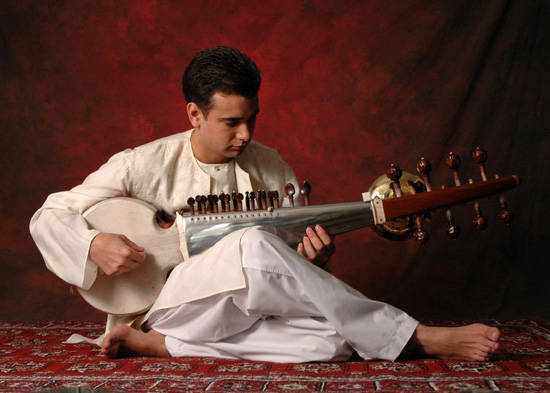
Being part of a musical lineage is an important part of who you are. You are one of the only people I know that can say they come from a long lineage in a family dedicated to this music. This interview is partly about your relationship to your lineage and your thoughts about the meaning of lineage. But I wanted to start with something simple…
Tell me about where you are now with your music?
Right now I am practicing rigorously and taking all my father’s classes. I instruct review classes, and give private instruction to students at the College. I am performing regularly as well, which involves contacting organizations and promoters and that takes up a lot of time.
As far as India, I played several times on this recent tour [Spring 2006]. I have a number of concerts being lined up by people who want to arrange performances for me in India for next year. I feel like I have been accepted in India, which means a lot to me being American.
Was this something you were worried or insecure about?
Not really, not musically, at least. I feel confident in what my father has taught me. I am confident fully in everything that he has taught me but I think vocal music would be harder for me to be accepted in, especially since I don’t speak the traditional languages very well. I am trying, but I don’t know them. I can’t speak fluently, and this is something that I would like to learn eventually. I am hoping to learn Hindi soon.
But instrumental music, I feel completely Indian in my playing. If you listen to me playing, you wouldn’t feel that I was not from India. And this is not an egotistical thing that I am saying, it is just confidence in my playing because I have been taught by my father to sound that way. I have been taught to play purely, and I have had the correct training, and I am still receiving that traditional training from my father. So I don’t feel that my sound would sound foreign.
I didn’t feel that I wouldn’t be accepted in that sense. I was more concerned with my ability to perform solo, to captivate an audience, to portray a raga, to play new variations, because these are the markers that determine authenticity. Not just playing in a boring or amateurish way…
I don’t consider myself a good musician or a learned musician. “I think I am just learning, that I am a student, and that I will always be a student…over there in India and here, I have been given good feedback and they are enjoying the music I play. So, in that sense, I wasn’t worried about being accepted…I was worried that they would just find me not ready to play at a solo level, not being able to play long enough performances, be conditioned enough in a solo setting by Indian standards…
I was very happy to be received well in India, and them wanting me to come back and play regularly validated me. It was really nice. But I didn’t feel surprised that they wouldn’t accept the sound, because that sound was taught to me by my father. I feel that I have very much received the correct training and can express our style correctly.
But the difference is our language. They may think, ”…He grew up in America. He is an American. He doesn’t know what India is all about. He doesn’t have the full exposure.” This has been expressed, that since I cannot speak Hindi and Bengali, I am lacking the full picture of things. To some extent this may be true.
But, from the point of music and what my father is teaching me, instrumental wise, it is ok. The main barrier is the language thing.
After talking to people in India, at the Dover Lane Festival, I ran into fans of my father. They recognized me during the intermission, in the middle of the show. They were elders who listened to my father growing up. They recognized me. They came up to me, and they talked to me. They talked my ear off for 45 minutes. I was trying to go, but I couldn’t because they were talking so passionately about the music. They said they believe in me, that they want me to keep playing, that Kolkata loves me, they love my father, they respect him, naming times they saw him in concert and through recordings…the said tjhat they wanted me to keep playing. That they wanted me to continue to come back, that all Kolkata loves me. I had felt this, but to hear complete strangers share this with me so passionately felt good to me. I had never talked to complete strangers so passionately about this before…which meant a lot to me, and made me feel more confident in what I am doing…I never feel like I will be where I could or should possibly be, but at least what I am doing now is to some people good enough, or they believe that I will do fine as long as I keep doing it.
You talk a lot about your father, and this idea of lineage. What does lineage meant to you? What is lineage and how important is it to your approach to music?
Of course, on a conscious and sub conscious level it plays a big part of my mental state that I come from a line of great musicians. That my father is one of the last great ones, him and his sister Annapurna. A lot of his children, some of them play, but I am one of the youngest ones. We are the next generation, learning and playing, and if we don’t keep it going, the students will carry it on, but I am someone who has been given his direct training, energy and teachings, I am definitely one of the last ones.
If I didn’t do this, it would haunt me that I didn’t do it…I ask myself, is this what I want to do? Am I happy? I realize that, sometimes, no I am not, but I feel like I definitely have a purpose in this life, and that purpose was given to me for a reason, and I didn’t just land in this situation for no reason…I think of all the other things I could do, but this is the one thing that I am truly passionate about. It is the only thing I have really been able to do. I could say to myself, “…Do what you want to do, don’t do what your parents want you to do,” but I have my father and being who he is, it is so intense and I am so involved in it, and I feel so strongly, and that this is really meant for me to do. Yes it is hard, and there are times that I don’t feel happy about it all the time…but nothing is easy. I think life is about sacrifice also.
When I think about how hard it is, I think that this is part of my sacrifice. I want to make people happy like my father did. The lineage is important, yes, but devotion to the music is the most important thing …and our family happens to be blessed with a huge part of that lineage of classical music. My grandfather and my father, these people become involved in lineage…they didn’t create it, but it came to them, through them, and they are blessed enough to have it reach the highest realization… My family is a huge channel for that music.
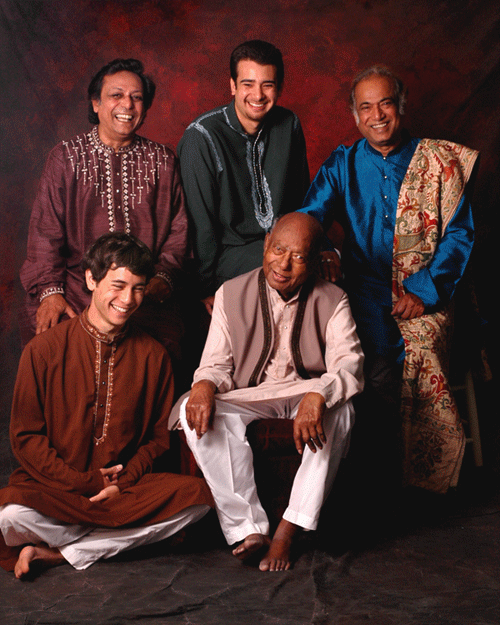
Maestro Ali Akbar Khan surrounded by (from left clockwise) son Manek, tabla maestro Swapan Chaudhuri, Alam, and eldest son Aashish
You talked about channeling, receiving direct energy from your father…is your process for learning music connected to your spirituality?
Spiritually this music is not for entertainment, it is not fashionable, not image saturated, and it transcends all of that. It came before all modern nonsense. The modern world has tried to seep into the music and turn it a certain way, but my father keeps it very traditional, the way he learned it. It is for your body, mind and soul, and one of the things that are great about my father, and all the masters living , and there are not many living these days, is that they are able to be open channels for love and compassion to come through them.
You don’t necessarily learn how to do that. I think it is karma based…you are born with this gift to some extent and then it is up to you to harness that ability and I think he has worked his entire life to do that to the level of mastery where he can leave his body or consciousness while he is playing, letting the music flow through him, so that he is a listener too, without effort…that is what mastery is, to be an open channel, and I hope that one day I can do that too…my grandfather used to say that you play and devote yourself so much to the ragas that you forget the time of day, your surroundings, the place you are in, your name, everything…you completely surround yourself with the raga, to reach a higher consciousness, a higher realization, enlightenment through music.
In order to achieve that, the music has to be very pure. The emphasis has to be on real pitch, rhythm, tuning…it is a whole different level that many people miss today. Especially with junk music today…it is fun, it is enjoyable, it gives you an emotion feeling, but it is not so fine tuned…like when a yogi or monk fine tune their bodies and minds so much, clear their minds, so they can be open channels. Like my father, he has so many memories, so many people around him, but he can clear all of that when he plays.
My father says that he wouldn’t be alive if it wasn’t for the music. The spiritual side of it is self evident, explanatory. If you listen to a real classical musician, when you listen to it, when you hear it, you will feel it…to intellectualize it, to talk about it, you can do only so much…but when you hear it, the places it can take you musically surpass all other genres of music. Indian classical music can take me there, and keep me there.
Let’s talk about “junk” music…how are traditional forms of music merging with electronic forms? What is your perception of this? Should classical music merge with these forms, or should it stay pure?
A lot of people are trying to merge this music, fuse this music with other forms…but I think that is just the medium through which people listen to music these days…through machines, beat machines for example. There is so much electronic music around us, and it is made and processed through beat machines, made electronically, through patches. It is a reflection of the generation today…we seek a quick fix, we have no time to meditate, no time to get in touch with old traditions. In modern society, we pick up our Yoga Journal magazine, we wear our T shirts with deities on them, and that makes us spiritual…but it is a whole state of mind, to embody that spirit, that spirituality, that the music misses nowadays…I like electronic music, I enjoy it, I listen to it, and I make it, so I would be a hypocrite if I said I didn’t like it or if it were bad and I didn’t enjoy it…but it can only take you to a certain place, it taps into different things, different kinds of emotions, vibrations…it is exciting, it is entertaining, it puts you in different moods, and serves as a soundtrack to things in your life, but it doesn’t get to the core essence nor can it keep you in that state.
You can hear a song, and it makes you feel a higher power, and for a moment touches on the full potential of what music can be…but in electronic music, there is a lot of carelessness on pitch, on timing, on tempo. Things are sloppy like that…and that bothers me. Really being in pitch, being in tune, is overlooked. It is almost careless…the music needs more focus on rhythm and the beat.
This is why I don’t think classical music fuses that well with electronic music. It is not pure music at that point. It is then a mix. I don’t think it is wrong, but I don’t think it should replace classical music. It would be tragic if people only listened to that, a fusion album with tabla, and they didn’t listen to the classical music that it is based upon. It would be really misplaced at that point.
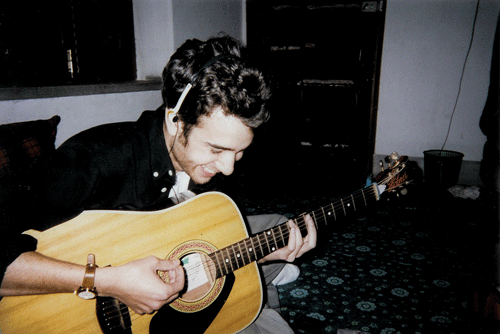
Alam playing acoustic guitar in Kolkata
Even if the music is good, it not the same. Classical music should stay classical, and that is that. It can be great, can be beautiful, but it cannot bring me to the same place … because all of the classical music was created in a systematic way, created for a reason. For the times of the day, the seasons, cosmology, the way the mind adjusts to the times of day, and for the body. The subtleties you find in classical music parallel the human body, there is so much richness…other kinds of music don’t feel so rich. They feel like they are lacking…people are using electronic machines, but how much depth can you achieve from that? It can only somewhat express it.
What are your thoughts about students who are not of lineage, not from a family steeped in music? In some ways, your grandfather found his way into this music as an outsider as well.
His story is truly remarkable. His father played sitar, played music, not a professional level and not to the extent of my father. He ran away from home at 8 years old to devote his entire life to music. That doesn’t happen to most people, normal people. It was like he was chosen, it was based on karma…so if you think about the lineage of the music and these souls that have been reborn, then we are all connected to that power, that cosmic force…a lot of people are not born to that, and my grandfather ran away to devote his whole life to that, and I am so humbled and honored to be a part of that, this family, because of the dedication and sacrifice they have devoted themselves to. And the higher power of the gods and goddesses to bless us with this music, that is the lineage that I am so honored to be a part of. I don’t think this happens to many people, and so my grandfather sought it out. It wasn’t handed to him, and he ran off to be a musician, and his father didn’t want him to be a musician.
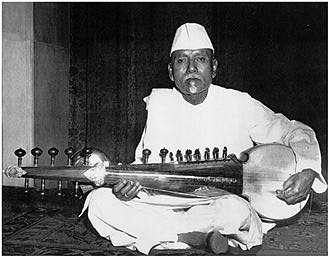
Alam's grandfather, Baba Allaudin Khan in Delhi, after he accepted the Padma Vibhushan awarded to him by the President of India.
This is one of the things I find most interesting about your family, that all of your family members promote the idea that you don’t have to be born into this music to study this music, that the Ali Akbar College of Music is open to anyone who wants to devote their time and life to music…and your grandfather represents that idea that studying this music does not require genetic or even gender lineage.
My grandfather said, “Spread this music as far as the sun shines.” You can be born to a great master, and that fact alone is a great honor, and is a part of the idea lineage…but it is up to you, to realize that potential, to honor that, to dedicate yourself, and sacrifice to study the music.
My father did not force me. Lineage plays a huge part to helping you do that as long as you dedicate yourself. That is tied into karma and fate…anybody, of course being Indian or born into the family, you could definitely be set back by being born in another country, to be a pure Indian classical musician would be difficult.
It is kind of a big subject…I know that I am honored to be a part of this family, I owe it to my family, to the people who showed so much love and dedication to this music, that I should learn this myself. I have felt that I want to dedicate my life to this music. I also believe in family and my dedication is to them and the gods and goddesses and the higher powers that have blessed us with this music…this has made me want to devote myself to this music. And this can be for anybody and their walk of life. You might not be the greatest musician or born into a certain family, and you can be an American student and this music can touch your heart, and it feels like an old friend, it feels right, and you understand the connection and you devote yourself to that, then you are devoting yourself to the lineage of the music…you may not be directly connected to it, but perhaps in a past life or in some karmic way you realize that you are connected, and you remember that to express that.
So what do you think the future of Indian classical music? Is it getting stronger?
The thing that separates our lineage from others, is that our family has kept it very pure. Nowadays, not many people are playing the music purely, they are modernizing it. My grandfather spent his own life learning this music to make it as pure as possible, and he learned it directly from the blood related descendents of Mian Tansen. Other traditions may water it down, so my lineage is very important to me. It is not the same as other lineages, and it is very strong, and those who are learning from this lineage are fortunate because it is a real one.
It is important to me that this music remains pure. As long as we play what our teachers gave us, then we will see the outcome. If we don’t practice and learn the music, then we won’t see it survive. We have the technology to sample the music and yes we can do that, but we must have a foundation or the building will collapse.
So you feel the music has a great deal of durability for survival in the west and in modern times?
It really depends on all the students, if the music survives or not. Audio and video archives will have compositions perserved. But, in terms of people being able to learn that and perform the music, that is the real question.
There is no lack in the teaching, but it is up to the students to absorb it, learn it and perform it. I hope that the highest caliber musicians continue performing. I hope I can do that, and I can reach my potential. I hope this music is always there, and that human beings are always touched by it. If we don’t keep the music alive, we will have forgotten where we come from. We will be rootless, and we will have this mishmash of sounds and samples we will call music. A music with no beginnings, no ends, no heads and no tails…this music will just be there, with no depth, no grounding.
There must be some order to the music…believing that music just is, and that we should just let it flow, is a mistake…the order is the dedication and love and the human work that people put into the music, and that is what gives it power. The caring and the respect for the sacred is what keeps it alive.
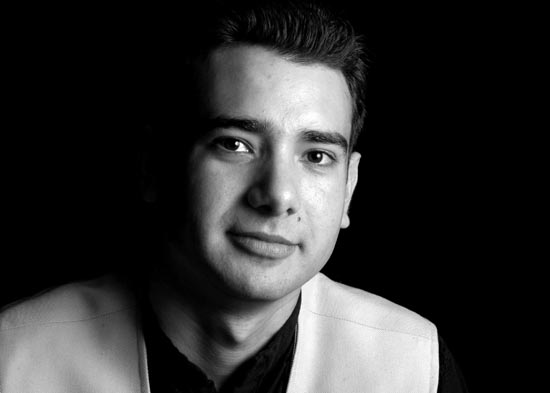
Tell me about your practice and how you approach learning music.
The intensity level of my practice, the way I practice is affected by what I learn. I shape my practice around my learning. My amount of practice changes…you have to put in the time. And I know you have to put in more. I learn from my father directly and on stage when we are together. You have to have a routine, if you don’t put in the time, you won’t see the benefit. You need to listen to a lot of music, play correct music, and learn compositions. At this point, where I am at, I have so much material from my father that I could practice that my entire life. What I need now, and what I am doing now is the practice that comes only through performance, that I don’t get by myself.
What do you learn through performance that you do not learn in private practice?
My aunt [Annapurna] doesn’t perform. The few times she did, she was received in the highest. So it is possible to achieve that level without performance. My father, on the other hand, performed his whole life. For me, I understand a certain thing when I am sitting in front of an audience, versus when I am sitting alone in my room.
Maybe it was the intensity of my grandfather, the feeling of confidence knowing that they could play in front of him then they could play in front of anybody. My father is not so strict with me in that way, and so I get intimidated by the audience, probably more so than my dad and aunt. They had solid backbones, and they put in much much more time practicing. And so, being in front of an audience and not turning back is part of creating new ways of approaching the music for me. Performing forces me to create on the spot, and so that is an important aspect of my playing.
Being American and not living in India, has that been challenging for you in terms of studying this music?
It doesn’t matter to me, at all, that I am not living in India, where this music originated because I have the best teacher here. If the teacher is here, why go to India? The energy and wisdom of that place is right here, through them you can see India. You don’t need to live there to learn the music.
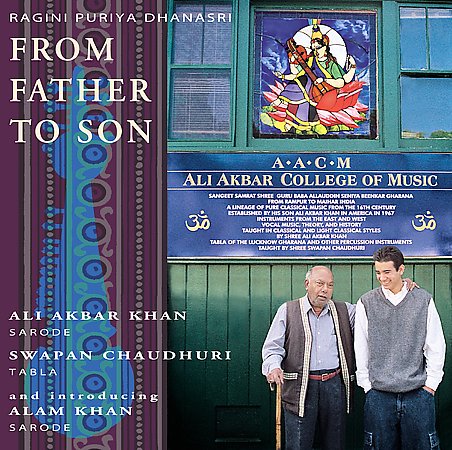
Alam is featured on "From Father to Son" released in 2002 and available through AMMP.
Robin Sukhadia
Mr. Hyphen 2006/2007








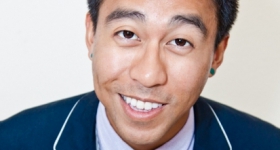
Comments